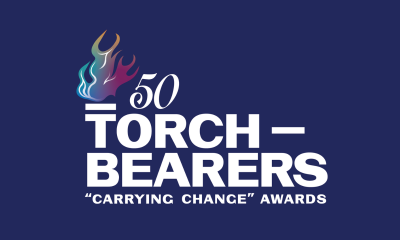Movies
The top 10 queer-centric movies of 2023
From ‘Rustin’ to ‘Barbie,’ it was a banner year in cinema
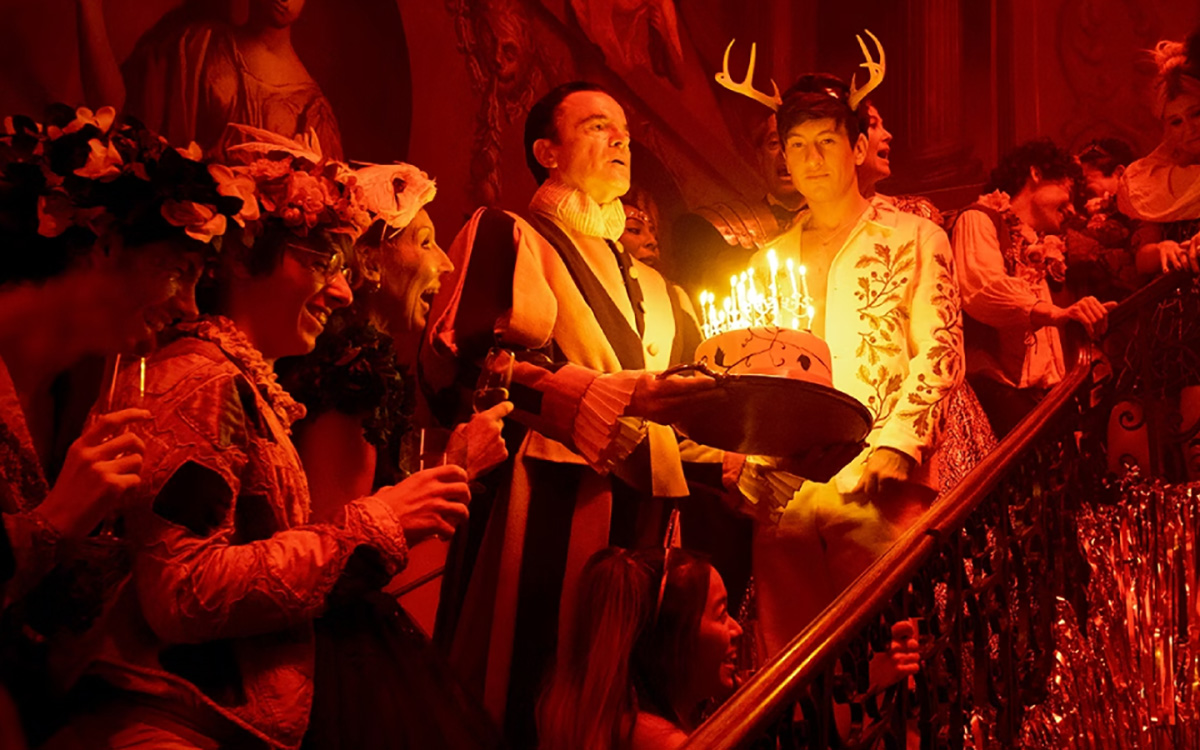
It’s been a great year for movies, we’re glad to say, but that’s made it harder than usual for us to compile our annual list of the 10 best queer-centric films. Still, we’ve made the hard calls necessary, and come up with our picks for the most outstanding of all the movies we’ve covered over the last 12 months.
You all know how these things work, so we won’t waste space with unnecessary explanations. Here, listed in reverse order, are the Blade’s Top Ten Films of 2023:
10. Rustin (Dir: George C. Wolfe)
Biopics face a difficult challenge when it comes to presenting an authentic portrayal of their subject: How do you encapsulate a person’s life into a two-hour story without relying on broad strokes? This frank and inspiring look at Civil Rights hero Bayard Rustin, whose monumental contribution to the movement was all-but-unsung for decades thanks to his open homosexuality, skirts the usual pitfalls by focusing on a specific episode in his career-orchestrating the 1963 March on Washington where MLK delivered his culture-shifting “I Have a Dream” speech – and delivering a behind-the-scenes snapshot of a seminal moment in American history at a time when stories about the triumph of activism feel more urgent than ever. Even so, it makes it onto our list mainly on the strength of star Colman Domingo, whose unapologetically thorny interpretation of the late queer icon is an engrossing – and refreshingly un-romanticized – powerhouse from start to finish.
9. Of An Age (Dir: Goran Stolevski)
What yearly “Best of” list would be complete without one or two under-the-radar gems? This Australian import (made in 2022, but released in the U.S. early this year) qualifies on both counts, but more importantly it’s a reminder that – despite frequent complaints to the contrary – there are great queer romance movies being made. This one is about two teens (Elias Anton and Thom Green) who spend a day together and fall hard for each other, but time and circumstance are not on their side; years later, reunited at a wedding, they find the connection between them has endured, but it may be too late to do anything about it. It’s a simple premise, and not much happens in terms of plot, but the winning authenticity of the love story it tells – and the way it captures unresolvable longing – is infinitely and universally relatable. It’s not a gay love story, it’s a love story between two people who happen to be gay, and that makes all the difference.
8. Rotting in the Sun (Dir: Sebastian Silva)
Even more under-the-radar, perhaps, is this out-of-left-field contender from out Chilean-born filmmaker Silva, who casts himself and real-life social media star Jordan Firstman as fictional versions of themselves in an outrageous, interwoven stream-of-events narrative that savagely satirizes the perpetually distracted state of self-obsessed modern culture while offering a darkly humorous commentary on cultural classism. It’s a lot to juggle in a single movie, but Silva pulls it off audaciously in a movie that does not go where you expect it to go and defies easy categorization by blending absurd farce with heartrending tragedy without missing a single beat. It also features un-simulated queer sex, and the fact that bold move is not the main attraction is itself testament to the power of this film’s unique vision. An MVP performance by veteran Chilean actress Catalina Saavedra is the richly satisfying icing on the cake.
7. Asteroid City (Dir: Wes Anderson)
This might be a controversial choice for us, given that critical response for this quintessentially Wes-Anderson-y think piece has been sharply divided and that the “queer factor” involved is relatively low; nevertheless, we stand by it, and only partly because the existential summer of “Barbenheimer” (more on that later) began with the quirky cult filmmaker’s visually stunning fantasia about a gathering of disparate characters in a kitschy New Mexican town for a government-sponsored “young inventors” competition during the height of 1950s-era “nuclear panic.” True to form, Anderson places meta-layers upon meta-layers by framing his narrative as a real-life theatrical play – penned by a queer playwright (Edward Norton) having a love affair with his leading man (Jason Schwartzman) – being memorialized in a TV documentary. And while this might make it hard for some to keep track of the story or identify with the characters, it also makes this movie into an almost perfect meditation on the way a cultural “zeitgeist” – in this case, the percolating dread that dominated world consciousness in the aftermath of the atomic bomb – manifests itself in our shared public imagination. An all-star cast of players (including Scarlett Johannson, Tom Hanks, Tilda Swinton and a host of others) only sweetens the pot.
6. May December (Dir: Todd Haynes)
It may be no surprise to see the latest film by “new queer cinema” icon Haynes on our list, but rest assured we’re not the only ones to recognize the brilliance of this uncomfortable character study in which a Hollywood actress (Natalie Portman), hired to star in a docudrama about a real-life tabloid sex scandal involving the inappropriate relationship and subsequent marriage between an adult woman (Julianne Moore) and an underage boy, descends on the couple’s household, stirring up long-unaddressed feelings for each of them as she loses herself in the persona of her role. Steeped in the tranquilizing suburban blandness that has always been a hallmark of Haynes’ melancholy, subversively divergent milieu, it’s the kind of movie that feels like a fever dream and leaves you grappling with issues you thought you’d worked out for yourself years ago – and while Portman and longtime Haynes muse Moore both deliver their usual stellar performances, it’s Charles Melton’s unexpectedly nuanced turn as the now-adult object of Moore’s transgressive desires that provides its troubled heart.
5. Oppenheimer (Dir: Christopher Nolan)
OK, there’s not really a specific queer angle to this introspective, epic-length film about the man who built the atom bomb, but the themes and questions it forces us to confront – all tied to the looming specter of effectively instant worldwide annihilation we’ve been living with ever since the nuclear blasts that brought WWII to an abrupt and sobering end – make it essential viewing anyway. Centered on the white-knuckle intensity of Cillian Murphy’s performance in the title role and bolstered by equally invested work from an all-star ensemble of supporting players (Emily Blunt, Robert Downey, Jr., Matt Damon, and more), Nolan’s finely wrought biopic becomes a meditation on responsibility, blame, the madness of mutually assured destruction, and – most significantly of all – living with an omnipresent sense of inevitable doom. Yet as depressing as all that sounds, the film resonates with enough humanity and compassion – even for its most ethically challenging characters – that we can walk away from it with something that feels almost like hope.
4. All of Us Strangers (Dir: Andrew Haigh)
Invading our list from the UK is the latest film from the writer/director who raised the bar for queer romance movies with 2011’s “Weekend,” a haunted (literally) love story in which a lonely London screenwriter (Andrew Scott) communes with the ghosts of his long-deceased parents (Claire Foy, Jaime Bell) while beginning a tentative relationship with a handsome but palpably sad neighbor (Paul Mescal). Based on a novel by Japanese author Taichi Yamada, it’s a ghostly tale more esoteric than supernatural, driven by mood, draped in primary colors, and infused with life through the tenderness between its two fragile lovers, less interested in the details of a hypothetical afterlife than it is in the bonds of love – in all its forms – which connect us to each other beyond time and mortality. Sure, it’s gloomy on the surface, and it brushes up against sorrows that are mercifully unfathomable to many of us, but it somehow manages to leave us uplifted rather than unsettled – and almost as a bonus, the sweet-and-sexy chemistry between its leading men will stick with you long after the final credits roll.
3. Saltburn (Dir: Emerald Fennell)
We’re not going to lie: part of what earns this gnarly, aggressively twisted movie a high place on our list is its audaciousness. In its tale of Oliver Quick (Barry Keoghan), a working class lad on scholarship to Oxford whose infatuation with a charismatic and wealthy classmate (Jacob Elordi) leads to a debauched and treacherous summer at the elegantly dilapidated country estate of the title, it turns a vaguely Dickensian story of fate, irony, and social commentary into an escalating wild ride that takes us places we don’t expect to go and never wanted to see, and it makes us love every guilty second of it. Yes, it’s dark and depraved, an over-the-top, starkly satirical look into the casually cruel world of the “ruling class” that forces us to ask just how far we would be willing to go to become a part of it, and it uses our own expectations against us to deliver a bombshell ending that might feel like a slap in the face for those who aren’t paying close attention (and possibly for those who are, too) – but all of that gives us even more reason to laud this second effort from the daring writer/director of “Promising Young Woman” as one of the most thrilling and unforgettable cinematic experiences of the year.
2. Killers of the Flower Moon (Dir: Martin Scorsese)
Like “Oppenheimer,” there’s no direct queer thread to be found in this late-career masterpiece from one of America’s most accomplished cinema artists, but its exploration of the deeply embedded racism that has been woven throughout our nation’s history has obvious resonance for anyone whose status as an “other” places them at risk of exploitation, oppression, and worse in a culture that is stacked against them. Based on the non-fiction book by David Gann, it chronicles a conspiracy in 1920s Oklahoma in which the indigenous Osage community, made rich by the oil fields under its tribal land, was robbed of its wealth by local white business leaders through a systematic campaign of marriage and murder, and the efforts of the then-fledgling FBI to bring the perpetrators to some kind of justice. With career-highlight performances from Leonardo DiCaprio and Robert DeNiro, as well as a revelatory turn from indigenous actor Lily Gladstone, there’s more than enough great acting to keep us mesmerized throughout its three-and-a-half-hour runtime – and the same understanding of the pathology of corruption that Scorsese deployed in his classic sagas about organized crime breathes powerful insight into a story that has just as much to say about the America we live in today as the one in which it takes place.
1. Barbie (Dir: Greta Gerwig)
When we first predicted this would be the movie of the year, our tongue may have been firmly planted in our cheek – but we’re not sorry to be able to say we were right. Not just a campy fantasy about a doll, it’s a truth bomb delivered in a candy-colored Trojan Horse, in which an unexpected existential crisis (do we detect a running theme in this year’s movies?) sends Barbie (Margot Robbie) into the human world looking for answers and ends up turning her own world upside down as Ken (Ryan Gosling), having seen the glories of “the patriarchy”, tries to remake Barbieland in his own image. It’s a premise that gives Gerwig (and partner Noah Baumbach, with whom she co-wrote the screenplay) plenty of fodder to skewer contemporary culture, and she takes aim at all the usual targets as she gleefully spreads the kind of progressive, humanitarian, pro-feminist, socially ethical messaging that conservative pundits like to fall over themselves dismissing as “woke” propaganda. But that’s not the endgame in this transcendent wonder of a movie, because Gerwig and company take things beyond the dualistic dogmas that stymie us in our quest for a more equitable world to ask some much deeper questions, creating a piece of absurdist cinema with as much intellectual weight as any film you’re ever likely to see. Of course, viewers hung up on the “culture war” talking points being batted around from every direction might not notice, any more than they are likely to notice the comprehensive array of nods and tributes she pays along the way to the iconic movies that inspired her, but one of the many joys of “Barbie” is that it reveals more with each repeat viewing – so there’s always hope they’ll catch on, eventually.
Oh, and even if the only queer content it contains comes in the form of deliciously unsubtle innuendo, there’s something quintessentially queer about it – and we’re not just talking about the color palette.
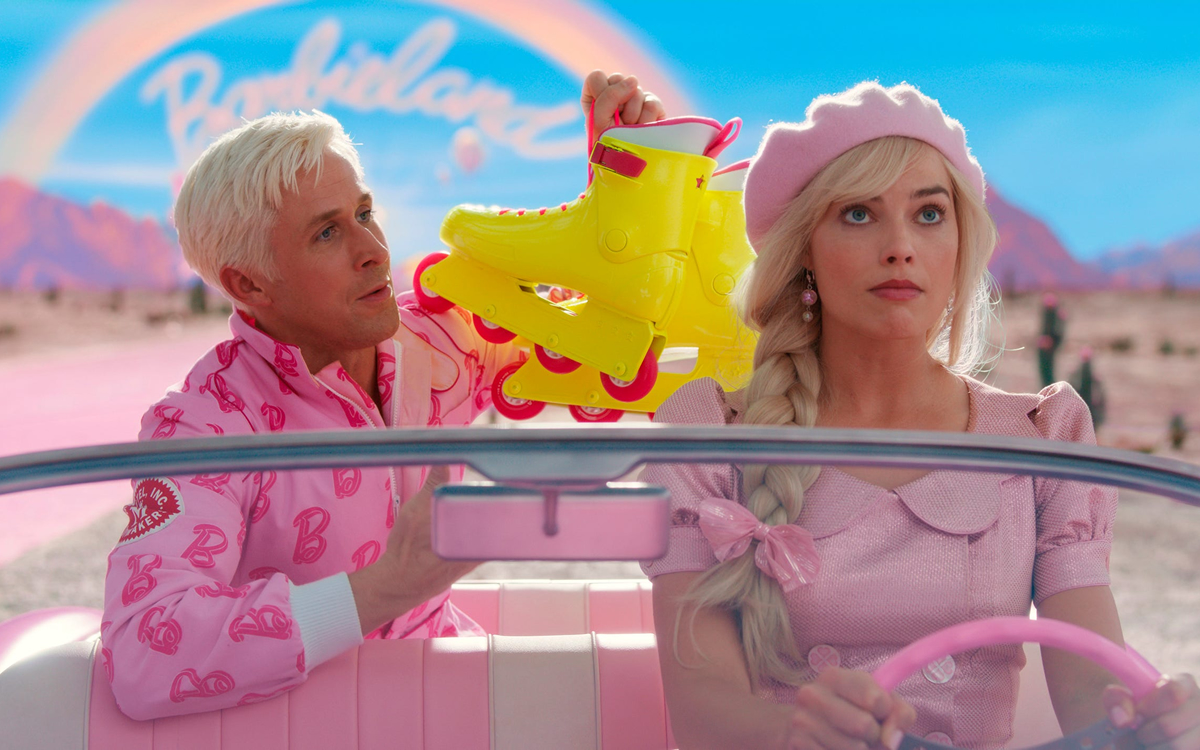
Movies
Rise of Chalamet continues in ‘Marty Supreme’
But subtext of ‘American Exceptionalism’ sparks online debate
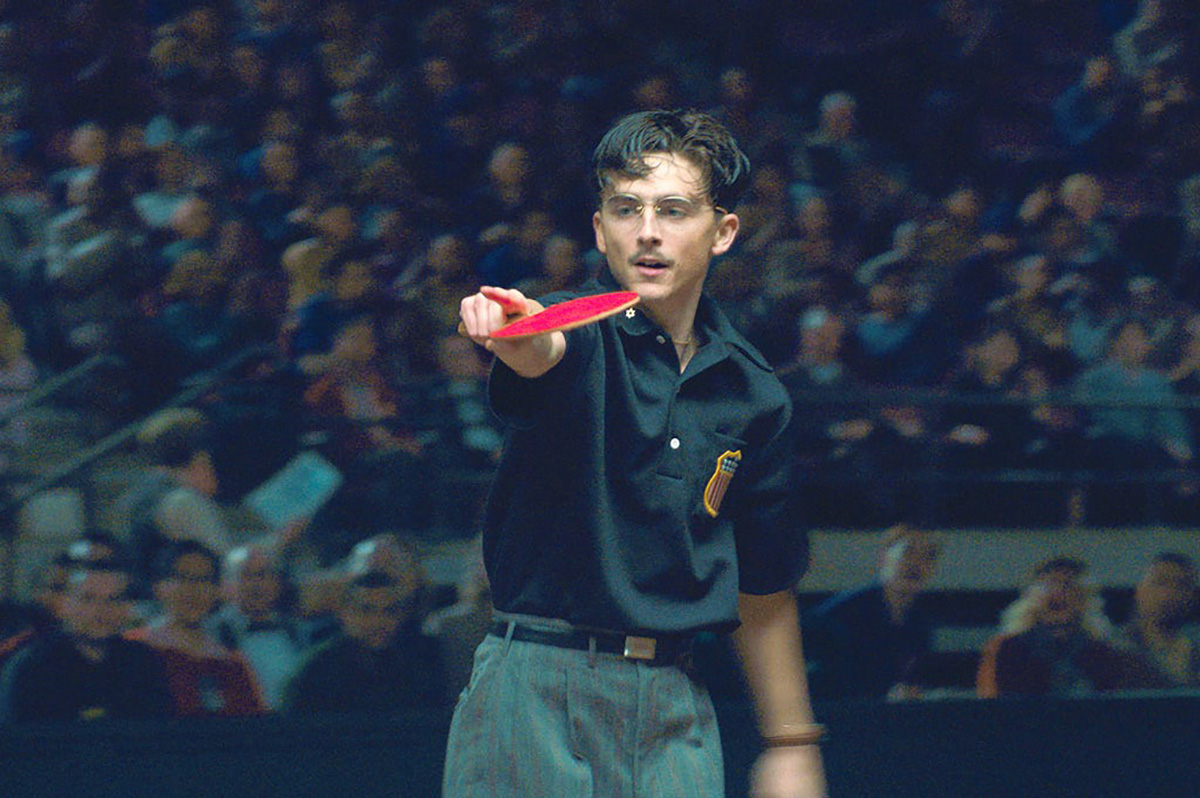
Casting is everything when it comes to making a movie. There’s a certain alchemy that happens when an actor and character are perfectly matched, blurring the lines of identity so that they seem to become one and the same. In some cases, the movie itself feels to us as if it could not exist without that person, that performance.
“Marty Supreme” is just such a movie. Whatever else can be said about Josh Safdie’s wild ride of a sports comedy – now in theaters and already racking up awards – it has accomplished exactly that rare magic, because the title character might very well be the role that Timothée Chalamet was born to play.
Loosely based on real-life table tennis pro Marty Reisman, who published his memoir “The Money Player” in 1974, this Marty (whose real surname is Mauser) is a first-generation American, a son of Jewish immigrant parents in post-WWII New York who works as a shoe salesman at his uncle’s store on the Lower East Side while building his reputation as a competitive table tennis player in his time off. Cocky, charismatic, and driven by dreams of championship, everything else in his life – including his childhood friend Rachel (Odessa A’zion), who is pregnant with his baby despite being married to someone else – takes a back seat as he attempts to make them come true, hustling every step of the way.
Inevitably, his determination to win leads him to cross a few ethical lines as he goes – such as stealing money for travel expenses, seducing a retired movie star (Gwyneth Paltrow), wooing her CEO husband (Kevin O’Leary) to sponsor him, and running afoul of the neighborhood mob boss (veteran filmmaker Abel Ferrara) – and a chain of consequences piles at his heels, threatening to undermine his success before it even has a chance to happen.
Filmed in 35mm and drenched in the visual style of the gritty-but-gorgeous “New Hollywood” cinema that Safdie – making his solo directorial debut without the collaboration of his brother Benny – so clearly seeks to evoke, “Marty Supreme” calls up unavoidable connections to the films of that era with its focus on an anti-hero protagonist trying to beat the system at its own game, as well as a kind of cynical amorality that somehow comes across more like a countercultural call-to-arms than a nihilistic social commentary. It’s a movie that feels much more challenging in the mid-2020s than it might have four or so decades ago, building its narrative around an ego-driven character who triggers all our contemporary progressive disdain; self-centered, reckless, and single-mindedly committed to attaining his own goals without regard for the collateral damage he inflicts on others in the process, he might easily – and perhaps justifiably – be branded as a classic example of the toxic male narcissist.
Yet to see him this way feels simplistic and reductive, a snap value judgment that ignores the context of time and place while invoking the kind of ethical purity that can easily blind us to the nuances of human behavior. After all, a flawed character is always much more authentic than a perfect one, and Marty Mauser is definitely flawed.
Yet in Chalamet’s hands, those flaws become the heart of a story that emphasizes a will to transcend the boundaries imposed by the circumstantial influences of class, ethnicity, and socially mandated hierarchy. His Marty is a person forging an escape path in a world that expects him to “know his place,” who is keenly aware of the anti-semitism and cultural conventions that keep him locked into a life of limited possibilities and who is willing to do whatever it takes to break free of them; and though he might draw our disapproval for the choices he makes, particularly with regard to his relationship with Rachel, he grows as he goes, navigating a character arc that is less interested in redemption for past sins than it is in finding the integrity to do better the next time – and frankly, that’s something that very few toxic male narcissists ever do.
In truth, it’s not surprising that Chalamet nails the part, considering that it’s the culmination of a project that began in 2018, when Safdie gave him Reisman’s book and suggested collaborating on a movie based on the story of his rise to success. The actor began training in table tennis, and continued to master it over the years, even bringing the necessary equipment to location shoots for movies like “Dune” so that he could perfect his skills – but physical skill aside, he always had what he needed to embody Marty. This is a character who knows what he’s got and is not ashamed to use it, who has the drive to succeed, the will to excel, and the confidence to be unapologetically himself while finding joy in the exercise of his talents, despite how he might be judged by those who see only ego. If any actor could be said to reflect those qualities, it’s Timothée Chalamet.
Other members of the cast also score deep impressions, especially A’zion, whose Rachel avoids tropes of victimhood to achieve her own unconventional character arc. Paltrow gives a remarkably vulnerable turn as the aging starlet who willingly allows Marty into her orbit despite the worldliness that tells her exactly what she’s getting into, while O’Leary embodies the kind of smug corporate venality that instantly positions him as the avatar for everything Marty is trying to escape. Queer fan-fave icons Fran Drescher and Sandra Bernhard also make small-but-memorable appearances, and real-life deaf table tennis player Koto Kawaguchi strikes a noble chord as the Japanese champion who becomes Marty’s de facto rival.
As for Safdie’s direction, it’s hard to find anything to criticize in his film’s visually stylish, sumptuously photographed (by Darius Khondji), and tightly paced delivery, which makes its two-and-a-half hour runtime fly by without a moment of drag.
It must be said that the screenplay – co-written by Safdie with Ronald Bronstein – leans heavily into an approach in which much of the plot hinges on implausible coincidences, ironic twists, and a general sense of orchestrated chaos that makes things occasionally feel a little too neat in the service of creating an outlandish “tall tale” narrative ; but let’s face it, life is like that sometimes, so it’s easy to overlook.
What might be more problematic, for some audiences, is Marty’s often insufferable – and occasionally downright ugly behavior. Yes, Chalamet infuses it all with humanizing authenticity, and the story is ultimately more about the character’s emotional evolution than it is about his winning at ping-pong, but it’s impossible not to read a subtext of American Exceptionalism into his winner-takes-all climb to victory – which is why “Marty Supreme,” for all its critical acclaim, is the subject of heated debate and outrage on social media right now.
As for us, we’re not condoning anything Marty does or says as he hustles his way to the winner’s circle. All we’re saying is that Timothée Chalamet has become an even better actor since he captured our attention (and a lot of gay hearts) in “Call Me By Your Name.”
And that’s saying a lot, because he was pretty great, even then.
Movies
A Shakespearean tragedy comes to life in exquisite ‘Hamnet’
Chloe Zhao’s devastating movie a touchstone for the ages
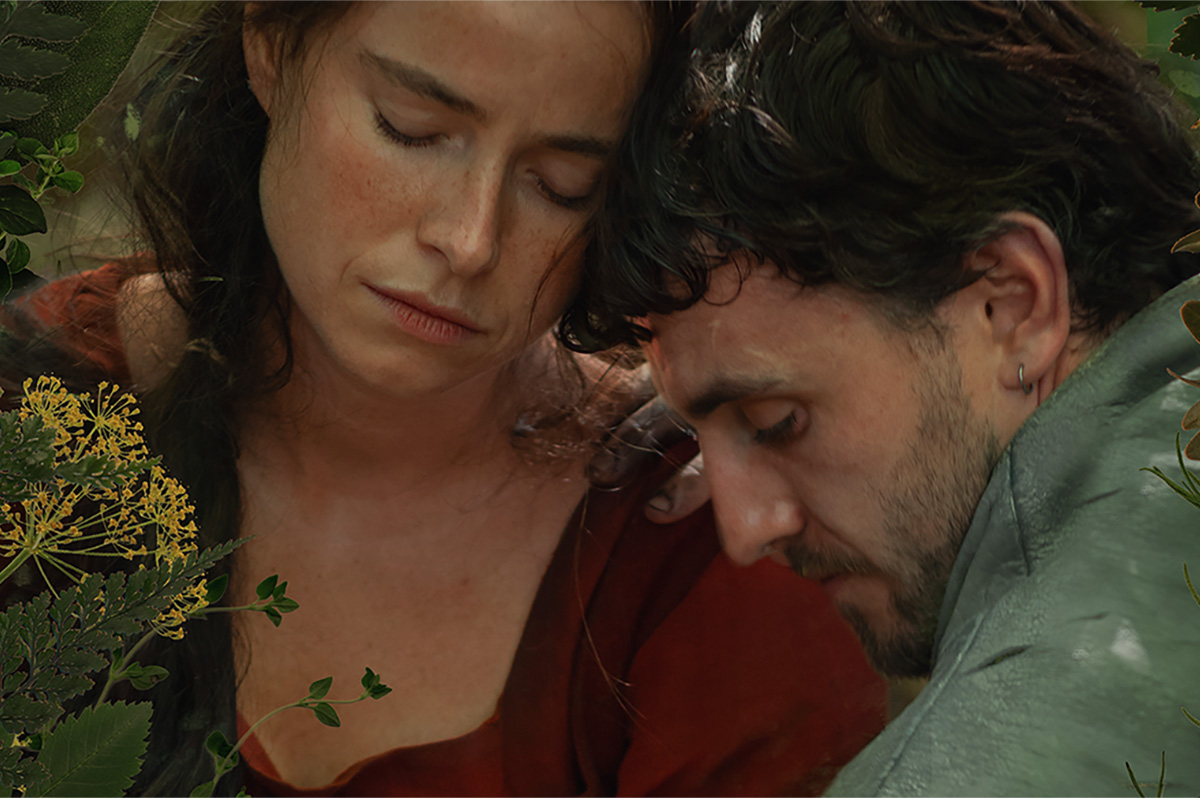
For every person who adores Shakespeare, there are probably a dozen more who wonder why.
We get it; his plays and poems, composed in a past when the predominant worldview was built around beliefs and ideologies that now feel as antiquated as the blend of poetry and prose in which he wrote them, can easily feel tied to social mores that are in direct opposition to our own, often reflecting the classist, sexist, and racist patriarchal dogma that continues to plague our world today. Why, then, should we still be so enthralled with him?
The answer to that question might be more eloquently expressed by Chloe Zhao’s “Hamnet” – now in wide release and already a winner in this year’s barely begun awards season – than through any explanation we could offer.
Adapted from the novel by Maggie O’Farrell (who co-wrote the screenplay with Zhao), it focuses its narrative on the relationship between Will Shakespeare (Paul Mescal) and his wife Agnes Hathaway (Jessie Buckley), who meet when the future playwright – working to pay off a debt for his abusive father – is still just a tutor helping the children of well-to-do families learn Latin. Enamored from afar at first sight, he woos his way into her life, and, convincing both of their families to approve the match (after she becomes pregnant with their first child), becomes her husband. More children follow – including Hamnet (Jacobi Jupe), a “surprise” twin boy to their second daughter – but, recognizing Will’s passion for writing and his frustration at being unable to follow it, Agnes encourages him to travel to London in order to immerse himself in his ambitions.
As the years go by, Agnes – aided by her mother-in-law (Emily Watson) and guided by the nature-centric pagan wisdom of her own deceased mother – raises the children while her husband, miles away, builds a successful career as the city’s most popular playwright. But when an outbreak of bubonic plague results in the death of 11-year-old Hamnet in Will’s absence, an emotional wedge is driven between them – especially when Agnes receives word that her husband’s latest play, titled “Hamlet,” an interchangeable equivalent to the name of their dead son, is about to debut on the London stage.
There is nothing, save the bare details of circumstance around the Shakespeare family, that can be called factual about the narrative told in “Hamnet.” Records of Shakespeare’s private life are sparse and short on context, largely limited to civic notations of fact – birth, marriage, and death announcements, legal documents, and other general records – that leave plenty of space in which to speculate about the personal nuance such mundane details might imply. What is known is that the Shakespeares lost their son, probably to plague, and that “Hamlet” – a play dominated by expressions of grief and existential musings about life and death – was written over the course of the next five years. Shakespearean scholars have filled in the blanks, and it’s hard to argue with their assumptions about the influence young Hamnet’s tragic death likely had over the creation of his father’s masterwork. What human being would not be haunted by such an event, and how could any artist could avoid channeling its impact into their work, not just for a time but for forever after?
In their screenplay, O’Farrell and Zhao imagine an Agnes Shakespeare (most records refer to her as “Anne” but her father’s will uses the name “Agnes”) who stands apart from the conventions of her town, born of a “wild woman” in the woods and raised in ancient traditions of mysticism and nature magic before being adopted into her well-off family, who presents a worthy match and an intellectual equal for the brilliantly passionate creator responsible for some of Western Civilization’s most enduring tales. They imagine a courtship that would have defied the customs of the time and a relationship that feels almost modern, grounded in a love and mutual respect that’s a far cry from most popular notions of what a 16th-century marriage might look like. More than that, they imagine that the devastating loss of a child – even in a time when the mortality rate for children was high – might create a rift between two parents who can only process their grief alone. And despite the fact that almost none of what O’Farrell and Zhao present to us can be seen, at best, as anything other than informed speculation, it all feels devastatingly true.
That’s the quality that “Hamnet” shares with the ever-popular Will Shakespeare; though it takes us into a past that feels as alien to us as if it took place upon a different planet, it evokes a connection to the simple experience of being human, which cuts through the differences in context. Just as the kings, heroes, and fools of Shakespeare’s plays express and embody the same emotional experiences that shape our own mundane modern lives, the film’s portrayal of these two real-life people torn apart by personal tragedy speaks directly to our own shared sense of loss – and it does so with an eloquence that, like Shakespeare’s, emerges from the story to make it feel as palpable as if their grief was our own.
Yes, the writing and direction – each bringing a powerfully feminine “voice” to the story – are key to the emotional impact of “Hamnet,” but it’s the performances of its stars that carry it to us. Mescal, once more proving himself a master at embodying the kind of vulnerable masculine tenderness that’s capable of melting our hearts, gives us an accessible Shakespeare, driven perhaps by a spark of genius yet deeply grounded in the tangible humanity that underscores the “everyman” sensibility that informs the man’s plays. But it’s Buckley’s movie, by a wide margin, and her bold, fierce, and deeply affecting performance gives voice to a powerful grief, a cry against the injustice and cruelty of what we fumblingly call “fate” that resonates deep within us and carries our own grief, over losses we’ve had and losses we know are yet to come, along with her on the journey to catharsis.
That’s the word – “catharsis” – that defines why Shakespeare (and by extension, “Hamnet”) still holds such power over the imagination of our human race all these centuries later. The circumstantial details of his stories, wrapped up in ancient ideologies that still haunt our cultural imagination, fall away in the face of the raw expression of humanity to which his characters give voice. When Hamlet asks “to be or not to be?,” he is not an old-world Danish Prince contemplating revenge against a traitor who murdered his father; he is Shakespeare himself, pondering the essential mystery of life and death, and he is us, too.
Likewise, the Agnes Shakespeare of “Hamnet” (masterfully enacted by Buckley) embodies all our own sorrows – past and future, real and imagined – and connects them to the well of human emotion from which we all must drink; it’s more powerful than we expect, and more cleansing than we imagine, and it makes Zhao’s exquisitely devastating movie into a touchstone for the ages.
We can’t presume to speak for Shakespeare, but we are pretty sure he would be pleased.
Movies
‘Hedda’ brings queer visibility to Golden Globes
Tessa Thompson up for Best Actress for new take on Ibsen classic

The 83rd annual Golden Globes awards are set for Sunday (CBS, 8 p.m. EST). One of the many bright spots this awards season is “Hedda,” a unique LGBTQ version of the classic Henrik Ibsen story, “Hedda Gabler,” starring powerhouses Nina Hoss, Tessa Thompson and Imogen Poots. A modern reinterpretation of a timeless story, the film and its cast have already received several nominations this awards season, including a Globes nod for Best Actress for Thompson.
Writer/director Nia DaCosta was fascinated by Ibsen’s play and the enigmatic character of the deeply complex Hedda, who in the original, is stuck in a marriage she doesn’t want, and still is drawn to her former lover, Eilert.
But in DaCosta’s adaptation, there’s a fundamental difference: Eilert is being played by Hoss, and is now named Eileen.
“That name change adds this element of queerness to the story as well,” said DaCosta at a recent Golden Globes press event. “And although some people read the original play as Hedda being queer, which I find interesting, which I didn’t necessarily…it was a side effect in my movie that everyone was queer once I changed Eilert to a woman.”
She added: “But it still, for me, stayed true to the original because I was staying true to all the themes and the feelings and the sort of muckiness that I love so much about the original work.”
Thompson, who is bisexual, enjoyed playing this new version of Hedda, noting that the queer love storyline gave the film “a whole lot of knockoff effects.”
“But I think more than that, I think fundamentally something that it does is give Hedda a real foil. Another woman who’s in the world who’s making very different choices. And I think this is a film that wants to explore that piece more than Ibsen’s.”
DaCosta making it a queer story “made that kind of jump off the page and get under my skin in a way that felt really immediate,” Thompson acknowledged.
“It wants to explore sort of pathways to personhood and gaining sort of agency over one’s life. In the original piece, you have Hedda saying, ‘for once, I want to be in control of a man’s destiny,’” said Thompson.
“And I think in our piece, you see a woman struggling with trying to be in control of her own. And I thought that sort of mind, what is in the original material, but made it just, for me, make sense as a modern woman now.”
It is because of Hedda’s jealousy and envy of Eileen and her new girlfriend (Poots) that we see the character make impulsive moves.
“I think to a modern sensibility, the idea of a woman being quite jealous of another woman and acting out on that is really something that there’s not a lot of patience or grace for that in the world that we live in now,” said Thompson.
“Which I appreciate. But I do think there is something really generative. What I discovered with playing Hedda is, if it’s not left unchecked, there’s something very generative about feelings like envy and jealousy, because they point us in the direction of self. They help us understand the kind of lives that we want to live.”
Hoss actually played Hedda on stage in Berlin for several years previously.
“When I read the script, I was so surprised and mesmerized by what this decision did that there’s an Eileen instead of an Ejlert Lovborg,” said Hoss. “I was so drawn to this woman immediately.”
The deep love that is still there between Hedda and Eileen was immediately evident, as soon as the characters meet onscreen.
“If she is able to have this emotion with Eileen’s eyes, I think she isn’t yet because she doesn’t want to be vulnerable,” said Hoss. “So she doesn’t allow herself to feel that because then she could get hurt. And that’s something Eileen never got through to. So that’s the deep sadness within Eileen that she couldn’t make her feel the love, but at least these two when they meet, you feel like, ‘Oh my God, it’s not yet done with those two.’’’
Onscreen and offscreen, Thompson and Hoss loved working with each other.
“She did such great, strong choices…I looked at her transforming, which was somewhat mesmerizing, and she was really dangerous,” Hoss enthused. “It’s like when she was Hedda, I was a little bit like, but on the other hand, of course, fascinated. And that’s the thing that these humans have that are slightly dangerous. They’re also very fascinating.”
Hoss said that’s what drew Eileen to Hedda.
“I think both women want to change each other, but actually how they are is what attracts them to each other. And they’re very complimentary in that sense. So they would make up a great couple, I would believe. But the way they are right now, they’re just not good for each other. So in a way, that’s what we were talking about. I think we thought, ‘well, the background story must have been something like a chaotic, wonderful, just exploring for the first time, being in love, being out of society, doing something slightly dangerous, hidden, and then not so hidden because they would enter the Bohemian world where it was kind of okay to be queer and to celebrate yourself and to explore it.’”
But up to a certain point, because Eileen started working and was really after, ‘This is what I want to do. I want to publish, I want to become someone in the academic world,’” noted Hoss.
Poots has had her hands full playing Eileen’s love interest as she also starred in the complicated drama, “The Chronology of Water” (based on the memoir by Lydia Yuknavitch and directed by queer actress Kristen Stewart).
“Because the character in ‘Hedda’ is the only person in that triptych of women who’s acting on her impulses, despite the fact she’s incredibly, seemingly fragile, she’s the only one who has the ability to move through cowardice,” Poots acknowledged. “And that’s an interesting thing.”
-

 U.S. Supreme Court4 days ago
U.S. Supreme Court4 days agoSupreme Court hears arguments in two critical cases on trans sports bans
-

 U.S. Supreme Court5 days ago
U.S. Supreme Court5 days agoAs Supreme Court weighs trans sports bans, advocate and former athlete speaks out
-

 Virginia4 days ago
Virginia4 days agoWoman arrested for anti-gay assault at Alexandria supermarket
-

 Commentary4 days ago
Commentary4 days agoHonoring 50 queer, trans women with inaugural ‘Carrying Change’ awards




















